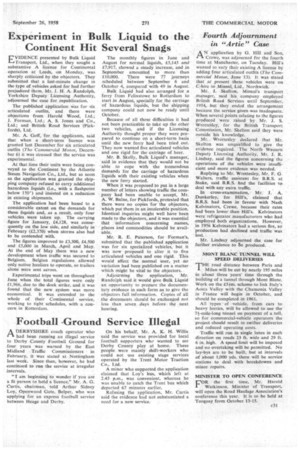Experiment in Bulk Liquid to the Continent Hit Several Snags
Page 97

If you've noticed an error in this article please click here to report it so we can fix it.
EV1DENCE presented by Bulk Liquid Transport, Ltd., when they sought a substantive A licence for Continental operation at Leeds, on Monday, was sharply criticized by the objectors. They submitted that a last-minute change in the type of vehicles asked for had further prejudiced them. Mr. J. H. A. Randolph, Yorkshire Deputy Licensing Authority, adjourned the case for republication.
The published application was for six articulated outfits, and there were objections from Harold Wood, Ltd.; J. Forman, Ltd.; A. S. Jones and Co., Ltd.; and British Road Services (Pickfords), Ltd.
Mr, A. Goff, for the applicants, said that when a short-term licence was granted last December for six articulated outfits (The Commercial Motor, December 6) it was stressed that the service was experimental.
At that time their units were being conveyed to the Continent by the Atlantic Steam Navigation Co., Ltd., but as soon as the application was granted the shipping company refused to carry additional hazardous liquids (i.e., with a flashpoint below 150°) and insisted on a reduction in existing shipments.
The application had been based to a considerable extent on the demands for these liquids and, as a result, only four vehicles were taken up. The carrying figure for January, £4,128, was consequently on the low side, and similarly in February (£2,370) when storms also had to be contended with.
The figures improved to £3,500, 14,500 and £5,000 in March, April and May. At the end of Ma' there was a new development when traffic was secured to Belgium. Belgian regulations allowed only native hauliers to operate, so trailers alone were sent across. .
Experimental trips went on throughout June when the total figures were only £1,966, due to the dock strike, and it was found that the new system was more economical. It was extended to the whole of their Continental service, working to tight schedules, with a concern in Rotterdam. The monthly figures in June and August for normal liquids, £5,145 .and 17,917, showed a steady increase, and in September amounted to more than £10,000. There were 77 journeys scheduled between September 6 and October 4, compared with 49 in August.
Bulk Liquid had also arranged for a ferry from Felixstowe to Rotterdam to start in August, specially for the carriage of hazardcius liquids, but the shipping company could not now be ready until October.
Because of all these difficulties it had not been practicable to take up the other two vehicles, and if the Licensing Authority thought proper they were prepared to continue on a short-term basis until the new ferry had been tried out. They now wanted five articulated vehicles and one rigid for the carriage of beer.
Mr. B. Skelly, Bulk Liquid's manager, said in evidence that they would not be able to cope with the tremendous demands for the carriage of hazardous liquids with their existing vehicles when the new ferry started.
When it was proposed to put in a large number of letters showing traffic the company had been unable to accept, Mr. A. W. Balne, for Pickfords, protested that there were no copies for the objectors, which put them in an intolerable position. Identical inquiries might well have been made to the objectors, and it was essential that information concerning names, places and commodities should be available.
Mr. R. E. Paterson, for Forman's, submitted that the published application was for six specialized vehicles, but it was now proposed to alter it to five articulated vehicles and one rigid. This would affect the normal user, yet 110 variation had been published on a matter which might be vital to the objectors.
Adjourning the application, Mr. Randolph said it would give -Bulk Liquid an opportunity to prepare the documentary evidence in such form as to give the objectors full information. Copies of all the documents should be exchanged not less than seven days before the • next hearing.












































































































































































































































































































































